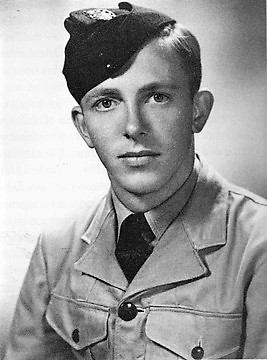BROWN, Alfred Jack
| Service Number: | 417694 |
|---|---|
| Enlisted: | 9 July 1942 |
| Last Rank: | Aircraftman 2 (WW2) |
| Last Unit: | Not yet discovered |
| Born: | Adelaide, South Australia, 14 June 1924 |
| Home Town: | Adelaide, South Australia |
| Schooling: | Prince Alfred College |
| Occupation: | Clerk (GPO Accounts) |
| Died: | Natural causes, Leyte, Philippines, 27 February 2013, aged 88 years |
| Cemetery: | Not yet discovered |
| Memorials: |
World War 2 Service
| 9 Jul 1942: | Enlisted Royal Australian Air Force, Aircraftman 2 (WW2), 417694, Adelaide, South Australia | |
|---|---|---|
| 9 Jul 1942: | Enlisted Royal Australian Air Force, Leading Aircraftman, 417694 | |
| 10 Jul 1942: | Involvement Royal Australian Air Force, Aircraftman 2 (WW2), 417694 |
Help us honour Alfred Jack Brown's service by contributing information, stories, and images so that they can be preserved for future generations.
Add my storyBiography contributed by Peter Sunners
When Jack Brown enlisted in the RAAF in June 1942 he had hopes of an aircrew muster and even the opportunity to become a pilot. During the initial training at Victor Harbor in South Australia, his home state, he demonstrated a natural ability as a wireless operator which led to him being recruited into top secret RAAF wireless units number 1 and then 6. These units worked to intercept radio transmissions sent in Japanese katakana code which were then decoded and analysed to produce highly reliable intelligence on Japanese movements. The operators were known as Katakana Men. In 1943 he went with No. 1 Wireless Unit to New Guinea, serving at Port Moresby, Nadzab, Biak and Hollandia. In October 1944 he joined the newly formed No. 6 Wireless Unit which went to the Philippines where they became part of General MacArthur's invasion at Leyte Gulf. Information from these units led to the destruction of hundreds of Japanese ships and thousands of planes. They also saved Allied ships, planes and bases across the Pacific, including those targeted by kamikaze pilots.
While General MacArthur credited them with shortening the war in the Pacific by two years the importance of their role was never recognized in their own country, Australia.
Jack Brown spent many years of his life trying to gain acknowledgement for the units that he believed they deserved. His book Katakana Man, which tells the story was published by the RAAF in 2006 after he won the 2005 RAAF Heritage Award for an early version of the manuscript. - Source: Katakana Man - Brown, A. Jack, 2006










